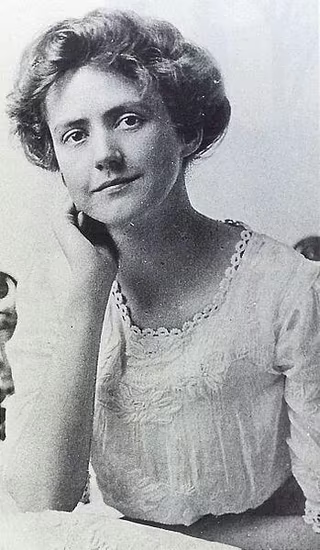
Quick Facts
Susan Keating Glaspell
Pen Name: Susan Glaspell
Born: July 1, 1876
Died: July 27, 1948
Nationality: American
Genres: Drama, Realism, Feminist Literature, Regional Fiction
Notable Works: Trifles, A Jury of Her Peers, The Verge, Inheritors, Alison's House
👶 Early Life and Education
Susan Keating Glaspell was born on July 1, 1876, in Davenport, Iowa, to Elmer Glaspell, a hay farmer, and Alice Keating, a public school teacher. Raised on a farm in rural Iowa, she often wrote about being worthy inheritors of the land, and was greatly influenced by the writings of Black Hawk, the Sauk American Indian chief, on whose former land she was raised. (The photo featured in this biographical sketch is her 1894 graduation picture.)
Susan was a precocious student, becoming a journalist at 18, and writing her own column at 20, using it to poke fun at Davenport's upper class. She attended Drake University in Des Moines, where she studied literature and the classics, excelling as a debater and representing the school at the state debates her senior year. She graduated in 1899.
📰 Journalism and Early Career
Glaspell excelled in a male-dominated field, becoming a reporter for The Des Moines Daily News where she covered murder cases and the state legislature. One case that deeply shaped her writing was the 1900 murder trial of Margaret Hossack, a farm wife accused of killing her husband with an axe — a case that would later inspire both her masterwork play Trifles and its short story adaptation, A Jury of Her Peers.
She quit the paper and began writing and publishing fiction stories for Harper's and The Ladies' Home Journal, which financed her move to Chicago. There she wrote her first novel, The Glory of the Conquered (1909), which became a New York Times best-seller, allowing her to tour Europe for a year and extending her artistic range and influences.
❤️ Personal Life
In 1913, Glaspell married George Cram Cook, a charismatic writer and intellectual from Davenport. The couple shared a passion for progressive ideals and the arts, and together they would transform American theater. They settled in Provincetown, Massachusetts, where they became central figures in a thriving community of artists and writers. In 1922, Cook grew disillusioned with commercial theater and moved to Greece, where he died in 1924. Glaspell honored his memory with a biography, The Road to the Temple (1927). She later formed a relationship with writer Norman Matson, with whom she collaborated on the play The Comic Artist (1927).
🎭 The Provincetown Players
In 1915, Glaspell and Cook co-founded the Provincetown Players, the first modern American theater company. The troupe began performing in a converted fish house on a wharf in Provincetown before moving to a permanent theater in New York's Greenwich Village. Glaspell wrote several groundbreaking plays for the company, including Trifles (1916), Inheritors (1921), and The Verge (1921). She also discovered Eugene O'Neill while scouting for the company's productions. Also associated with the Players were Edna St. Vincent Millay, Theodore Dreiser, and Floyd Dell.
Though her theater company was a critical success, it didn't earn enough to pay the bills, so Glaspell continued to write and sell her short stories to make ends meet.
✒️ Notable Works
Trifles (1916), her one-act play based on the murder trial she covered as a young reporter, is considered one of the great works in American theater and an important piece of feminist literature. A Jury of Her Peers (1917), published in Every Week magazine, was a short story adaptation of the play and has become one of the most anthologized American short stories. Her play Alison's House (1930), loosely inspired by the life of Emily Dickinson, won the Pulitzer Prize for Drama in 1931. Over her career, Glaspell published nine novels, fifteen plays, and over fifty short stories.
🌿 Writing Style
Glaspell's writing blends realism with elements of expressionism, often set in her native Midwest. Her works explore feminist themes — women's struggle for expression in a patriarchal culture, the bonds between women, and the compromises of marriage — alongside broader questions of American identity, social conformity, and individual conscience. Her style ranges from the spare realism of Trifles to the bold expressionism of The Verge, making her one of the most formally adventurous American playwrights of her era.
🏡 Later Years and Death
In her later years, Glaspell struggled with depression and poor health. In 1936, she was appointed Midwest Bureau Director of the Federal Theater Project during the Great Depression, a role that reflected her lifelong commitment to making theater accessible. She continued writing novels, including The Morning is Near Us (1939), which was the Literary Guild Book of the Month selection for April 1940, selling more than 100,000 copies. Her final novel, Judd Rankin's Daughter, was published in 1945.
Susan Glaspell died of viral pneumonia and pulmonary embolism on July 27, 1948, in Provincetown, Massachusetts.
✨ Legacy
Interest in Glaspell's plays languished until the 1970s, when her works were rediscovered and became fixtures in the core curriculum of women's studies programs at American colleges and universities. Today she is recognized as a pioneering feminist writer and is often called "the Mother of American Drama." Her works are featured in our Feminist Literature Study Guide, Pulitzer Prizes, and Mystery Stories collections.
⭐ Interesting Facts
- Glaspell discovered Eugene O'Neill and gave him his first theatrical production with the Provincetown Players.
- Her play Trifles was written in just ten days.
- She wrote her first published story at age 18, while still working as a newspaper reporter in Iowa.
- Her 1912 collection Lifted Masks drew directly from her journalism experiences, with several stories based on real people and events she had covered.
Frequently Asked Questions about Susan Glaspell
Where can I find study guides for Susan Glaspell's stories?
We offer free interactive study guides for the following Susan Glaspell stories:
- A Jury of Her Peers — comprehension questions, vocabulary review, and discussion prompts